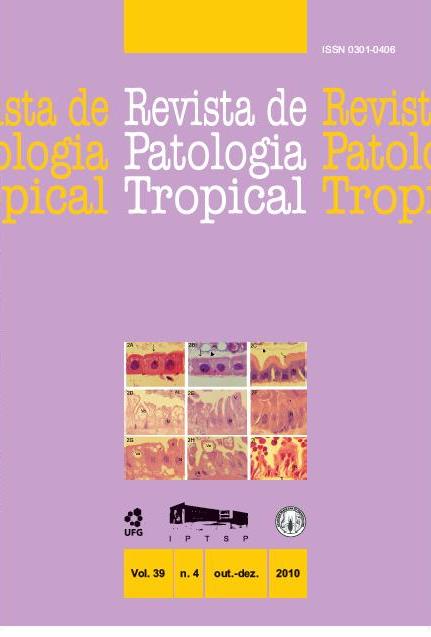Prevalência de inaptidão sorológica pelo Vírus HCV em doadores de sangue no Hemocentro regional de Uberaba (MG), Fundação Hemominas
DOI:
https://doi.org/10.5216/rpt.v39i4.13061Palavras-chave:
Prevalência, doadores de sangue, HCV.Resumo
Introdução: Hepatite C é causada por flavivírus e sua prevenção é feita especialmente pela triagem sorológica nos bancos de sangue. Objetivos: Calcular a prevalência de doações inaptas pelo vírusda Hepatite C (HCV), analisar o perfil epidemiológico dos inaptos e a tendência de inaptidão por HCV e verificar a concordância entre os testes ELISA e RIBA (Recombinant Immunoblot Assay).
Métodos: estudo retrospectivo da sorologia das doações realizadas no Hemocentro Regional de Uberaba (HRU) entre 1995 e 2008, análise do perfil segundo valores proporcionais (para 10.000 doações), estudo de tendência através do coeficiente de correlação linear, com 5% de significância e
análise da concordância entre ELISA e RIBA com cálculo do coeficiente kappa. Resultados: Foram realizadas, no período, 218.871 doações, sendo 814 (0,4%) inaptas por sorologia para o HCV pelo ELISA, com proporções superiores e estatisticamente significativas de inaptos do gênero
masculino, idade igual ou superior a 30 anos, procedentes de Uberaba e casados. Houve correlação linear forte inversamente proporcional dos índices de inaptidão para HCV com os anos de estudo (r = - 0,870631). A concordância entre ELISA e RIBA foi de 46,8% (kappa = 0,637). Conclusão:Por meio da análise desses resultados, demonstrou-se uma tendência decrescente de inaptidão para
HCV entre doadores, indicando queda do risco de contaminação via transfusão de sangue.
Downloads
Downloads
Publicado
Como Citar
Edição
Seção
Licença
The manuscript submission must be accompanied by a letter signed by all authors stating their full name and email address, confirming that the manuscript or part of it has not been published or is under consideration for publication elsewhere, and agreeing to transfer copyright in all media and formats for Journal of Tropical Pathology.

